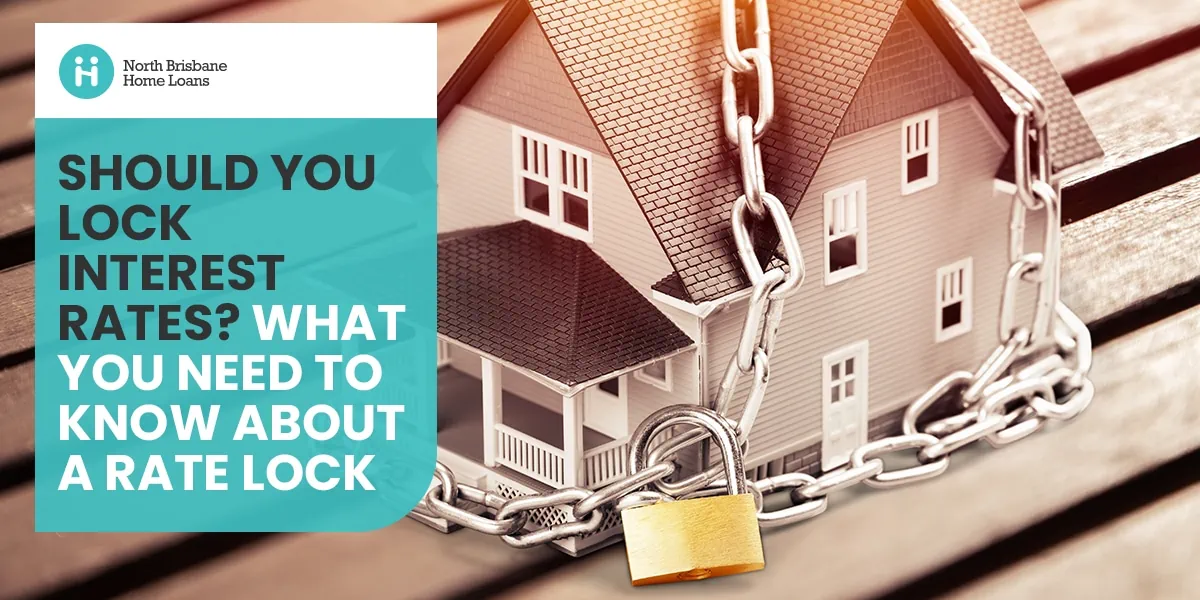Should You Lock Interest Rates? What You Need to Know About a Rate Lock
What are interest rates and is it ideal to lock interest rates when you get yourself a mortgage? What are the advantages and disadvantages of a rate lock? When do you lock in a mortgage rate and when shouldn’t you choose this option?
One of the factors people look into when they take out any loan is the interest rate. An interest rate is a percentage charged on the principal amount borrowed, representing the cost of borrowing. In a way, interest rates are the heartbeat of the financial world, influencing decisions from personal loans to home loans to massive corporate investments.
In a dynamic housing market and with economic fluctuations, understanding interest rates becomes even more crucial to a homeowner. One of the primary concerns for potential homeowners, when they take out a mortgage, is whether they should lock in their interest rates. Let’s explore this in detail.
What is a Mortgage Rate Lock?
A rate lock, also known as a “lock-in interest rate”, is a commitment between the borrower and the lender. This agreement ensures that the interest rate remains unchanged between the loan offer and its finalisation, irrespective of market movements. When you decide to lock interest rates, you’re essentially securing a specific rate for a predetermined period, which can range from 30 to 90 days, or even longer in some cases.
With a housing market that’s known for its vibrancy and occasional volatility, seeing surges in property prices is not uncommon since the mortgage landscape is continuously evolving. The Reserve Bank of Australia (RBA) plays a pivotal role in setting the cash rate in the country, which indirectly influences the interest rates offered by banks. Keeping an eye on the RBA’s decisions can give borrowers a hint about future interest rate movements.
Why Do Mortgage Rates Change?
Interest rates are determined by many different factors, the most important one being the economy. If the economy is doing well, then interest rates will go up. If the economy is slowing, then interest rates will fall.
Another factor is the Reserve Bank of Australia (RBA) cash rate which influences mortgage rates. The RBA rate is determined by the Government Reserve Bank of Australia to keep inflation in check.
Next is the demand for mortgages. High demand for homes normally means higher mortgage rates and low demand means low rates. Low-interest rates can encourage prospective home buyers to purchase property while high-interest rates can make them think twice about buying at that point in time.
Understanding Rate Locks and Factors Affecting It
Benefits of Locking in an Interest Rate
So, why is a rate lock a good idea? Here are some of its known benefits:
- Stability – In an unpredictable market, a rate lock offers stability. You’ll know exactly what your interest rate will be, allowing for consistent financial planning.
- Protection Against Rate Hikes – If the RBA decides to increase the cash rate or the bank increases it outside of the RBA cycle while you’re in a settlement, those with a locked rate are shielded from the immediate impact.
- Budgeting – You can set monthly repayments early, which means you can budget more effectively, without worrying about fluctuating interest costs.
Potential Drawbacks of Locking Interest Rates
Of course, not all situations will compel you to lock in an interest rate. There are a few times when it’s not beneficial to you. Here are some reasons why:
- Opportunity Costs – If rates decrease, you might miss out on potential savings. This is the risk you take when you lock in a rate.
- Fees and Charges – Some lenders might impose a fee for locking in a rate. It’s essential to factor in these costs when calculating potential savings.
- Reduced Flexibility – A rate lock might come with conditions. For instance, if you decide to pay off a chunk of your mortgage suddenly, you might face penalties.
Factors Influencing Rate Lock Decisions
Before you sign on the dotted line and ask your mortgage broker to lock in your mortgage rate, there are a few things you need to think about. Here are some of them:
- Duration of the Loan – If you’re pondering, “How long can you lock in a mortgage rate?”, remember that while most locks last between 30 to 90 days, some lenders offer extended periods, especially for larger loans or construction loans.
- Economic Predictions – Keeping an ear to the ground about Australia’s economic forecasts can provide hints. For instance, if there’s chatter about potential rate hikes in the coming months, it might be wise to lock in a rate.
- Your Financial Goals – If stability and predictability align with your financial goals, a rate lock might be the right choice.
How to Lock Interest Rates
Now that you’re armed with the pros and cons of a rate lock, it’s time to learn about the steps involved when you lock interest rates. Note that doing these with the help of an experienced mortgage broker will help expedite the process and make it easier for you.
- Research – The journey starts with getting help from a professional mortgage broker to research various lenders and their rate lock policies. Some might offer this feature for free, while others might charge a nominal amount.
- Consultation – Discuss these options with your mortgage broker to understand the nuances of their offerings and to help you make an informed decision.
- Lock-in the Rate – Once you’ve come to a decision, let your mortgage broker know and have them lock in the rate and the rate period you chose.
- Documentation – Ensure all agreements are properly documented. A verbal agreement won’t protect you if there’s a dispute regarding your mortgage.
Considerations to Make Before You Lock Interest Rates
After finding out what a rate lock is and how to lock interest rates, there are still a few more things to consider before you lock in your interest rate.
1. Know the expiry date of your current fixed rate
It helps borrowers to know when their existing fixed rate will expire so they can act promptly. It usually takes six to eight weeks for notifications to come through.
When you decide to lock your interest rate, you can choose to do it the moment your home loan application is approved or do it later. You have approximately 1 week before settlement to do this as it may be necessary for loan documents to be reworked. It’s normally sorted out at the front end of the application to ensure you are fully aware of all implications and costs.
If you have misgivings about this choice, talk to an expert mortgage broker. They can tell you how much time it takes to settle and your best option for a rate lock period, among other things.
2. Get your mortgage broker to review rates from other lenders
Rates vary widely depending on the loan product. A trusted mortgage broker can research fixed rates available to you from a range of banks and lenders on their panel. They can also negotiate with your current lender on your behalf to help you score the right rate with your current lender. This can help to reduce or cement your repayments.
An experienced mortgage broker can easily do in-depth market research to look at possible alternatives you can qualify for, to help you make the right decision.
3. Evaluate your personal plans and timeline
You must time your financial decisions around your personal plans. Any lifestyle changes, like having a baby, changing jobs, shifting careers, or drastic changes in the way you live your life, can impact your financial capabilities.
Evaluating your own timeline with a mortgage broker will help you decide if you want a short-term fixed rate, a long-term fixed rate, or a variable loan in this instance.
4. Look up and consider other possible rate options
Research other mortgage solutions and use online mortgage calculators to customise your repayments based on your budget. Check your rate options as well to see which one will work for you best. If you’re not certain which of the options presented to you is the most ideal for your situation, a mortgage broker from NBHL can help. An expert mortgage broker will take all your personal factors into consideration when advising you on which loan is right for you.
5. Restructure your mortgage to suit your needs
Restructuring your mortgage means changing the way you repay your debt. This can include lengthening the overall length term or altering the frequency of your interest payments. You can also choose to “spread the risk” by breaking your loan up into pieces and having it fixed across different terms. This way, you can avoid getting hit with a sudden increase following the expiry of your fixed rate.
Speaking to an NBHL mortgage broker to understand all your options is a good direction to take. They can help explain your options and outline what these will mean for you. They will help you in making the right mortgage decisions that are in line with your financial goals and current situation.
What Happens When a Rate Lock Ends?
When a rate lock ends, it marks the expiration of the agreed-upon period during which a lender guarantees a specific interest rate for a mortgage loan. Typically, rate locks are available for durations such as 30, 45, or 60 days. This helps ensure that the borrower is shielded from potential fluctuations in the market interest rates during the home buying or refinancing process.
If a rate lock expires before the loan process is completed, a few things can happen.
- The borrower might be offered an extension, sometimes at an additional cost.
- If market rates have increased, the borrower might have to accept the current higher rate.
- If the rates have decreased, some lenders might offer a “float-down” option, allowing borrowers to capitalise on the lower rates.
It’s crucial to understand the terms of the rate lock agreement and communicate with your mortgage broker to navigate any potential rate changes effectively.
Rate Lock vs Fixed-Rate Period
People can easily confuse these two with one another and with good reason. Both give homeowners similar benefits since they offer protection against volatile interest rates, but do note that they operate at different stages of the mortgage journey.
Rate Lock – An agreement between a borrower and a lender, ensuring that a specific interest rate on a mortgage remains unchanged for a set duration, typically ranging from 30 to 60 days.
Fixed-rate Period – Refers to the span during which the interest rate of a mortgage remains constant, irrespective of market dynamics. This period can last for several years, depending on the terms of the mortgage agreement.
Rate locks come into play during the initial loan application and approval process, ensuring that borrowers aren’t affected by sudden market changes. In contrast, fixed-rate periods offer long-term assurance, ensuring that borrowers pay a consistent interest rate for a significant portion of their loan tenure.
Is There A “Right Time” To Lock in A New Rate?
The short answer is no. The “right time” will depend on your individual circumstances and the current financial state of the Australian economy.
The decision to lock in an interest rate is multifaceted. It can be influenced by personal financial goals, market predictions, and the broader Australian economic landscape. While a rate lock offers stability, it’s essential to approach the decision with a comprehensive understanding of its implications.
Consulting with financial experts before you lock interest rates can give you access to tailored advice, ensuring you make the best decision for your unique situation.
If you need more information on rate locks and if you’re wondering “Should I lock in my interest rate?”, the North Brisbane Home Loans team will be glad to help.









